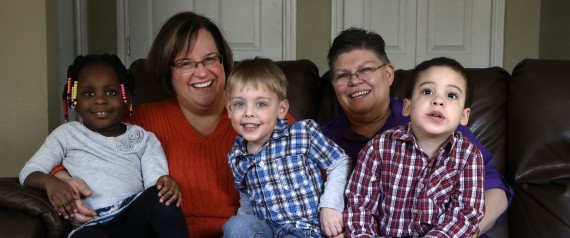When April DeBoer and Jayne Rowse’s case goes to trial in Detroit this fall, it could mean the end of Michigan’s ban on gay marriage. But that hasn’t stopped the state’s top lawyer from pushing back against the lawsuit with a recent filing arguing the gay marriage ban allows the state to “regulate sexual relationships.”
The lesbian couple initially sued over a law banning joint adoption by same-sex couples: DeBoer has adopted a 3-year-old girl and Rowse has adopted 3- and 4-year old boys. But U.S. District Court Judge Bernard Friedman, a conservative, recommended they instead challenge the constitutionality of Michigan’s ban on gay marriage.
Earlier this month, Attorney General Bill Schuette filed a brief in the case in which he claimed the state’s definition of marriage was needed to “regulate sexual relationships” and their “unique procreative capacity”:
Responsible procreation and childrearing are well-recognized as legitimate State interests served by marriage.
One of the paramount purposes of marriage in Michigan — and at least 37 other states that define marriage as a union between a man and a woman — is, and has always been, to regulate sexual relationships between men and women so that the unique procreative capacity of such relationships benefits rather than harms society. The understanding of marriage as a union of man and woman, uniquely involving the rearing of children born of their union, is age-old, universal, and enduring. As illustrated by a plethora of research, social scientists have consistently recognized the essential connection between marriage and responsible procreation and childrearing.
In a statement, LGBT advocacy group Equality Michigan Managing Director Emily Dievendorf countered that Schuette’s stance was “hypocritical” and not aligned with the Supreme Court’s ruling against the Defense of Marriage Act.
“The U.S. Supreme Court … found that regulating sex for the purpose of procreation is not a role for our government,” Dievendorf said in a statement. “Marriage is about more than just procreation, as the Supreme Court said this June, ‘marriage is a way for couples to define themselves by their commitment to each other.’ Suggesting the benefit of marriage is limited to just producing children is more insulting and damaging to the institution of marriage than anything Schuette fears.”
This is not Schuette’s first opposition. When he filed a motion to dismiss the case in July, Friedman denied it, writing that DeBoer and Rowse were “entitled to their day in court and they shall have it.”
After the Supreme Court struck down DOMA in June, Schuette reiterated that the ruling had no effect on Michigan’s gay marriage ban.
“Michigan’s Constitution stands and the will of the people to define marriage as between one man and one woman endures in the Great Lakes State.”
But the “will of the people” may have changed since 2004, when the constitutional amendment banning same-sex marriage passed with 59 percent of the vote. A statewide poll published by the Detroit News earlier this month found that 57 percent of Michiganders support same-sex marriage, a 12.5 percent increase from 2012. However, a poll last month showed that a small majority in Michigan, just over 51 percent, of 600 likely voters would oppose legislation or a ballot measure seeking to allow same-sex marriage.
For some Michiganders, Schuette’s brief felt deeply personal. Chris Lacefield is trying to adopt a child with his partner. In a blog post Tuesday, he wrote that the state is failing its LGBT community, as well as some of its children:
“We want to welcome a child into our home, because we want to start a family,” he wrote. “Despite the fact that the state we call home does not recognize our relationship and would not recognize our family, we, like many couples our age, feel the basic human need to provide for the next generation. There are children in Michigan who need loving, stable, two parent homes. And Michigan fails them.”
“Rather than focusing on the ability of a couple to procreate, perhaps we should be focused on the ability of a couple to provide love, education and moral structure to the children who are already part of our population,” Lacefield said.





